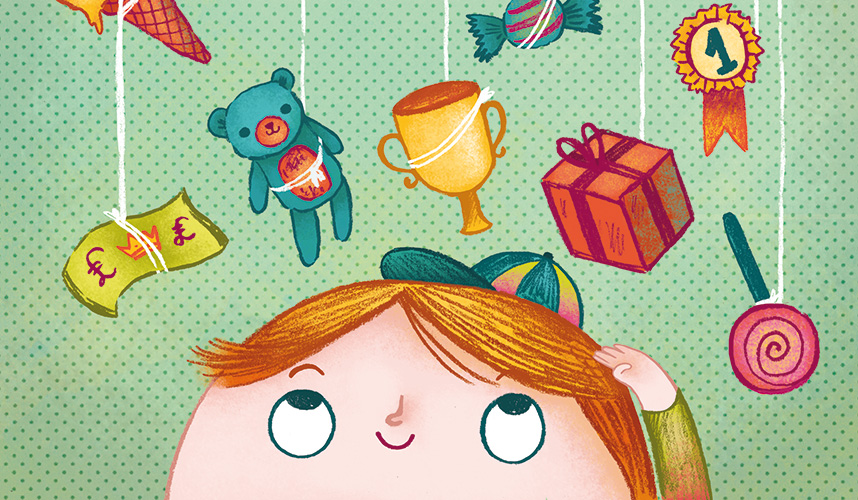A recent article in a parents’ magazine recommended using a “reward jar” for motivating children. The jar is filled with small toys or other rewards, to be given out when the child completes certain specified tasks, or changes his or her behaviour at the parent’s request.
I like the fact that parents who use rewards are motivated to find a less punitive method of helping their children to learn important things. I say “less punitive”, though, rather than “non-punitive”, because inherent in a reward system, whether voiced or not, is the possibility of failure – both failure to obtain the reward and failure to please the parent. Inevitably, the possibility of failure brings fear of failure.
Rewards, though on the surface so much more appealing than punishments, do have some built-in risks and problems. The biggest problem is the hidden message that if there were no reward, the child would not perform the task in question. It can even be said that the fear of not being rewarded is a punishment. As author and educator John Holt wrote, “When we make a child afraid, we stop learning dead in its tracks.”
MESSAGES CHILDREN HEAR
When rewards are offered, children may hear these messages:
- The message that they may not recognize and appreciate on their own what is important to learn in life, that they should learn only what others reward them for. They may then begin to disregard or question their own personal preferences and enthusiasms.
- The message that they can’t trust their own decisions, that they should always seek an “expert” opinion before proceeding with a project, and that it is unwise to rely on their own perceptions and intuitions about the world around them. They may then begin to question their own choices and preferences.
- The message that the specific task being rewarded must be to some extent difficult or unpleasant, otherwise why has someone taken the trouble to set up a reward system? After all, no one has ever had to offer a reward to get a child to eat ice cream!
HARMFUL RESULTS
In addition to these unintended messages, there can also be some harmful results:
- If the parent takes an authoritarian role, and determines how a child’s difficulties should be resolved, the child loses the golden opportunity to practice problem-solving, and the family misses potentially better solutions the child may have invented if given the chance to do so.
- Extrinsic rewards take the child’s attention away from intrinsic ones. The child may never understand the real reasons for doing something, and may never appreciate the inherent rewards that a task will provide. For example, a child who reads a book in order to receive a sticker from the librarian, may miss the point that reading is enjoyable all on its own. In this sense, the child is being given less than a true picture of the world.
- Most importantly, the child’s real needs may be missed and remain unmet, only to surface later. All of a child’s behaviour can be viewed as an outward manifestation of a legitimate inner need. Until that underlying need is dealt with fully, the only changes that can take place will be superficial. These underlying needs cannot be met through artificial, arbitrary rewards. If a child’s reluctance to go to bed is really a message about loneliness or an impending illness, that need may never be recognized if it is coated over with rewards. If a child’s important needs remain unmet, he may receive the unintended message that the parent doesn’t care about his feelings and needs, but merely wants him to conform outwardly to the parent’s needs.
FOCUS ON INTRINISIC REWARDS
My own preference, when helping a child to learn a new task, is to stay focused on intrinsic rewards. All external rewards – whether tokens, school grades, gifts, or deliberate, manipulative praise – are arbitrary; that is, they bear no direct relationship to the matter at hand. Interestingly, punishment has the very same built-in problem. For example, helping a child to learn the importance of keeping one’s room orderly and clean, while staying focused on the actual issue, would mean helping the child to appreciate the inherent rewards: the ease of finding wanted items, the avoidance of health problems, especially if there are allergies, the avoidance of breakage and other accidents, and the fact that there is simply a good feeling in an orderly environment.
These kinds of explanations, if shared respectfully, will make more sense to the child than any external reward, and will also show trust in his own abilities and motivations. This approach also has the benefit of helping the parent to determine priorities. If a parent can’t explain the reason for doing something, maybe it isn’t worth the effort of helping the child to do it! In a “focused” discussion, it may be the parent who learns the most about priorities: “keeping a room spotless all the time” may be less important in the grand scheme of things than “having time to play in an unhurried way with a parent or sibling”.
OFFERING ACTUAL HELP
Using a focused approach with an emphasis on intrinsic rewards, the parent is also free to offer the child practical tips and actual help. The parent and child remain on the same side, so that both can contribute ideas to make certain projects easier. When external rewards or punishments are used, the parent is more likely to feel that the child must perform the task alone.
“The use of external rewards is a type of control, manipulating our children to do our agenda. All methods which rely on controlling the child have a price, paid for by the child, the parent and the relationship”
When my son was young, I was fortunate to find books, by John Holt and others, that clarified the importance of focusing on intrinsic values. I began to believe that children could appreciate the benefits of such things as an orderly room, and I helped my son to identify the inherent rewards that orderliness brings. He felt free to ask for my advice and help, and I felt free to help him whenever necessary. Over time, he learned that every effort toward cleaning a room – or any other meaningful activity – always brought along its own rewards. He learned that such rewards are automatic and immediate. He is now 18, and his housekeeping skills and habits are better than my own. I am still working on this part of my own life, in part because of the stressful feelings that became associated with cleaning when I was young.
CULTIVATING RESPECT
A good rule of thumb in parenting (or in any other relationship) is that anything that keeps us on the same side as our child is more respectful and consequently will “work” better, than anything that sets up a hierarchy and puts a cold distance between us, such as parent-set standards and extrinsic rewards for “targeted behaviour”.
By staying on the same side, we express trust in our child’s ability to appreciate intrinsic rewards, and to grow to be an adult who can think for himself, set his own standards and priorities, and identify whatever inherent rewards are available through his own efforts. And as my friend and colleague Mary Van Doren once noted, “raising children with an emphasis on intrinsic rewards is not a technique, a method or a trick to get them to do what the parent wants them to by subtler means, but a way of life, a way of living with children with real respect for their intelligence and for their being.”
The critical question is: What is it that we want? If we simply want a clean room, it may come about at an earlier age if we use rewards and punishments – but there may be unintended results: fears and unfortunate associations instilled in the child, damage to the parent-child bond, and the hidden message that the child cannot be trusted to learn without external motivators. The use of external rewards is a type of control, manipulating our children to do our agenda. All methods which rely on controlling the child have a price, paid for by the child, the parent and the relationship. Damage to self-esteem and self-knowledge is the highest price.
If we want more than the clean room – if we want the child to learn to appreciate intrinsic rewards, to have faith in his own judgment, to believe in his own ability to determine what is truly worth doing, without seeking an authority figure – it may take years longer, but it will be well worth our extra effort and patience. Parents who have taken the longer route of trusting and helping the child to gain self-motivation through a sensible appraisal of inherent rewards and values, find that this is intrinsically gainful for them as well. It is far more rewarding to the parent to raise a child to be independent, self-confident, realistic, and self-motivating, than it is to see an orderly bedroom at age six! If we use trust, patience, and gentle explanations instead of rewards or punishments, children are then free to “own” their learning and personal growth. The less authoritarian we can be, while not relinquishing our role as our child’s wise yet gentle guide, the more secure will be the learning that takes place.
READ The Natural Child: Parenting From the Heart by Jan Hunt, offering a loving, respectful approach to raising a happy, trusting and confident child.
EXPLORE Jan developed a set of Parenting Cards that each feature a unique reminder about compassionate parenting, available from naturalchild.org/parentingcards.
VISIT At naturalchild.org/advice, Jan offers advice on all stages of parenting, across a wide variety of subjects.
ILLUSTRATION Laura Wood







